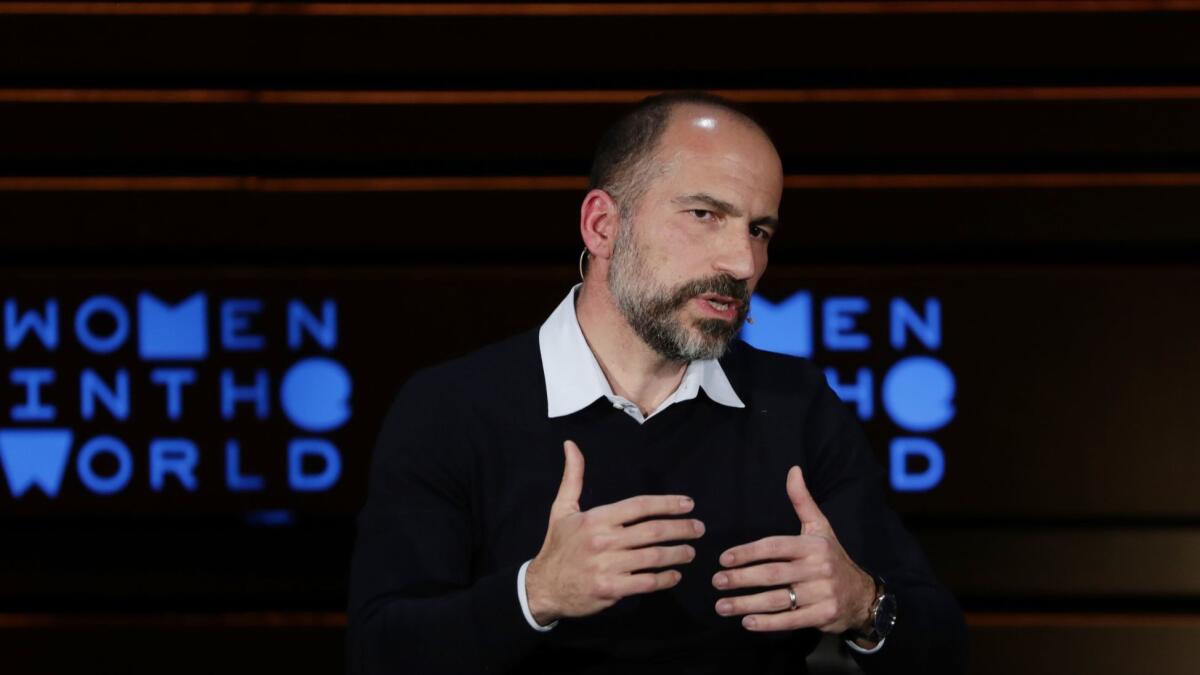Uber stops requiring sexual misconduct victims to quietly use arbitration instead of suing

- Share via
Reporting from SAN FRANCISCO — As Uber continues its makeover from Silicon Valley bad boy to good corporate citizen, the ride-hailing giant announced Tuesday that it will no longer require that drivers, employees or customers who allege sexual assault or harassment go through arbitration instead of suing the company.
Previously, Uber’s terms of use required them to resolve any legal disputes with the San Francisco company through arbitration, a form of dispute resolution that takes place outside the courts and away from public scrutiny. The company had given drivers and employees — but not riders — a 30-day period to opt out of that provision.
Under the new system, anyone who brings sexual harassment or assault claims against Uber will be able to do so in private mediation, arbitration or open court.
“We have learned it’s important to give sexual assault and harassment survivors control of how they pursue their claim,” Tony West, Uber’s chief legal officer, said in a company blog post. “Whatever they decide, they will be free to tell their story wherever and however they see fit.”
The company also announced that it will no longer require sexual assault and harassment survivors to sign confidentiality provisions in settlement agreements. And it will publish a transparency report on sexual assaults and other incidents reported during Uber rides.
Lawyers who have filed sexual harassment and assault claims against Uber welcomed the announcement, but they criticized the company for not going further to allow groups of people to file class-action lawsuits against it. Under its existing user agreement, employees, drivers and riders are not able to participate in group litigation against the company.
“Preventing victims from proceeding together on a class basis shows that Uber is not fully committed to meaningful change,” said Jeanne M. Christensen, a partner at law firm Wigdor, which is representing 15 women who plan to sue Uber, alleging sexual assault or rape.
“Victims are more likely to come forward knowing they can proceed as a group,” Christensen said. “This [change that Uber announced Tuesday] is the beginning of a longer process needed to meaningfully improve safety.”
The changes come as Uber tries to repair its public image after a tumultuous 2017 in which former employees alleged systemic sexual harassment, discrimination and coverups at the company. The months of scandal led to the ouster of its co-founder and chief executive, Travis Kalanick. In August, former Expedia CEO Dara Khosrowshahi took the helm.
Khosrowshahi has signaled his intention to clean up Uber’s culture and image and to take the business, which has a valuation exceeding $60 billion, public in 2019. Under his leadership the company has launched a new app for drivers, promising them a better experience, and pledged to be more transparent with employees and customers, adopting the mantra, “We do the right thing. Period.” — a far cry from Uber’s previous internal mantras, which included “Always be hustlin’” and “Meritocracy and toe-stepping.”
UPDATES:
10:25 a.m.: This article was updated throughout with Times staff reporting.
7:10 a.m.: This article was updated with comment from attorney Jeanne Christensen.
This article was originally published at 4:45 a.m.







